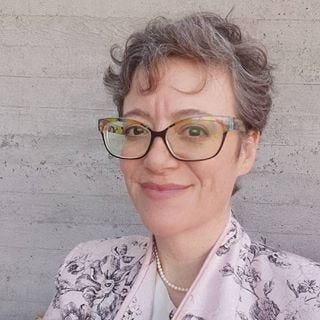
Cybersecurity In-Depth: Feature articles on security strategy, latest trends, and people to know.
How 4 Young Musicians Hacked Sheet Music to Help Fight the Cold War
In 1985, a group of klezmer musicians from the US rendezvoused with underground dissidents in Tbilisi, Georgia. This is the story of how they pulled it off with homebrew cryptography.
June 10, 2022

RSA CONFERENCE 2022 — Not all activists carry a picket sign. Some carry a soprano saxophone and a music notebook.
"1985 was a really rough go of it for people who were human-rights activists," said Dr. Merryl Goldberg, music professor at California State University San Marcos, at a keynote at RSA Conference 2022 on Wednesday. "Dissidents, human rights activists, refuseniks, Helsinki Monitors had formed — in Tbilisi, Georgia, of all places — a group, a musical group, to band together, literally." This was the Phantom Orchestra, which she would travel across the world to meet.
Her own band was Klezmer Conservatory Band. Goldberg and bandmates Hankus Netsky, Rosalie Gerut, and Jeff Warschauer traveled together to the USSR, according to a 1986 article. Activist groups in the United States, particularly Action for Soviet Jewry, conceived their mission as a way to bring international notice to a group of dissidents who otherwise could be disposed of namelessly. If the world knows these people exist and are facing persecution, the thinking went, the Soviet government would not have as free a hand.
"That's when some people in Boston had the idea, 'Maybe we should go in and support them — but also find out if there was information that should come out as well,'" Goldberg said. So this group of four young musicians volunteered to take a trip to the Soviet Union, during the Cold War.

Dr. Merryl Goldberg (Source: RSA Conference screengrab)
Despite the cloak-and-dagger feel, this wasn't a spy mission. The information they were seeking to smuggle out was simple personal information like names, family relationships, and birth dates. The information simple but essential if a Soviet citizen wanted to get an invitation to travel outside the USSR — and from there defect.
"There were a couple of people who wanted to be invited, and so we coded all of their information in order to bring that out so they could receive an invitation," Goldberg said. "Most of the folks ended up emigrating, which is really good, but what they had to put up with in order to emigrate was really something."
Don't worry. This ties into cryptography.
What Music Can Mean, Literally
Because of the precarious position of the people Goldberg and her bandmates were hoping to meet, the Americans had to encode the contact information for the Georgian dissidents.
"We couldn't write down the names of people or their addresses or things like that because it would put them in jeopardy if at customs they saw that," she said. "And it would put us in jeopardy as well."
So she found a way to write things down without making them explicit: using musical notation as an alphabet, essentially. Goldberg didn't go into the details of her code, though she did lead the audience through the directions to a dissident's apartment, shown in the image above.
Britta Glade, senior director of content and curation for RSA Conference, interviewed Goldberg. "Let's jump into some of your coding," she said.
The first Phantom Orchestra members they were to meet were the Goldsteins, brothers Isai and Grigory.
"You're seeing directions to get to one of the apartments. So we knew we had to go on the Orange line [subway], stop at the end, Cross Street — that's the name of the street," Goldberg explained. "On the bottom line, I couldn't figure out a way to write it out, so I actually drew where the apartment was in the building. That's what that is. There's a little tiny square in the top square, and that was where the apartment was."
For the more complex information, like names and other personal information, Goldberg had to come up with a flexible alphabet that couldn't be read at a glance. "What I did — without giving away the story of the whole code — is I just assigned certain notes to certain letters, and then I played around with some decoy stuff in terms of the clefs," she said.
Glade is also a musician — she played one of Goldberg's encoded songs on a keyboard set up on the stage. "There's a scientific, predictable way music is gonna sound," Glade said. "It's just like programming, right?" And this programming sounded ... kinda bad.
"If you study music, like modern music, you would hear music like this, perhaps," Goldberg said, laughing. "One of the cool things about music and coding is people invent notation anyway. And they write crazy things." That made it difficult for anyone to look at even that awkward sheet music and see any real grounds for suspicion.
What Music Can Mean, Metaphorically
As technologist Bruce Schneier said during his RSA keynote, any system can be a code. Goldberg used her system — music — to encode directions that helped her and her bandmates connect with musicians in the USSR and to bring home information that would allow some of those dissidents to emigrate. So for those refuseniks, music meant freedom.
"Before I met the people in the Phantom Orchestra, I understood the power of music – I'm a musician. I play, and when I play, I get into this other space," Goldberg said. "When we played with the Phantom Orchestra, the power of our playing together and the freedom in our brains was something that I'll never forget. It has become a part of me."
She had to choke back some emotion to say, "But while we're playing, I understood: You can be imprisoned, you can be put wherever, and ultimately we were interrogated many more times and put under arrest, [but] in your brain you can still feel free. And I hadn't understood that power of music until then."
Glade brought it back to cybersecurity. "We're constantly getting pounded, pounded, pounded – you're under attack from this, this is happening here – we need to be taken, transformed, put in a [new] place," she said. "What does music offer us?"
Goldberg answered.
"Music is used as a way to center and ground yourself. The act and the discipline to practicing music enables you to listen better," she said. "A lot of what you do, from my understanding, is really dealing with people and understanding people and how they make decisions. They do problem-solving, right? The arts, music, but also visual arts, teach you how to solve problems, how to work well with each other."
'Long Shadows of the Cold War'
The invasion of Ukraine is casting "some long shadows of the Cold War that are maybe bringing up some emotions," Glade said. "What's in your heart and your head?"
"I really admire the musicians and the activists who are in Ukraine, who stay — Denys [Karachevtsev], who's the cellist you've seen," she answered.
Glade added, "The little girl singing in the subway."
"Yes," Goldberg said. "I also think about Brittney Griner. And I think, 'I hope she can ... keep her brain free, even though she's not.' Because that makes such a difference."
"I really think about what's going on and how people are coping," she added.
Glade and Goldberg closed out with one good way to cope: a klezmer song called "Broyges Tantz" — Yiddish for "angry dance."
About the Author
You May Also Like

